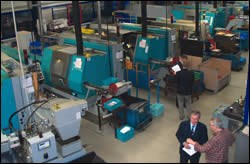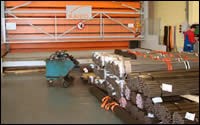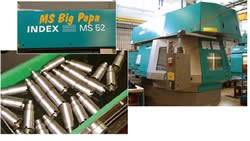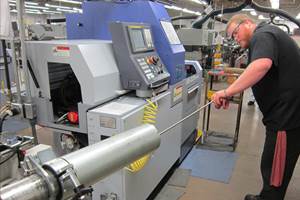Taking Its Turn
This family-owned job shop is more interested in what its capital investments can do than how much they cost. Keeping its demanding automotive customers happy means paying attention to the details and applying the right technology to the job.
As part of a press tour through southern Germany earlier this year, our host, Index Corporation, arranged access to several of its customers’ shops. While it was good to see an OEM’s facilities, for a trade press editor, visiting shops is like mother’s milk. Seeing technology applied in an independent business environment adds validation to the usual one-dimensional presentation that an OEM factory tour alone generally provides.
One of those shops is WST, a family-owned job shop located in Löffingen, Germany. This shop is a high-volume producer of precision turned parts with automotive, specifically Daimler, being its largest customer.
Starting with one machine in a garage back in 1993, WST has steadily grown to more than 6,300 square meters of floor space and 115 employees. It’s a production machine shop with lot sizes from 500 to 2 million pieces per year. It also relies on the change-over flexibility provided by CNC technology to accommodate the almost 3,000 active part numbers that run through the shop.
WST bought its first CNC machine from Index and has remained loyal to the brand, with currently 80 percent of its 60-plus machine tools being from Index. The shop is organized into single-spindle, multi-spindle and vertical turning departments that cover its production range of 5-mm to 100-mm diameter workpiece bar and blank sizes.
Making Difficult Parts
Like its U.S.-based cousins, WST is feeling competitive pressures from low-cost producers. Manuel Willmann, son of the company founder, says the company’s strategy to stay competitive is multi-pronged. “We look at everything,” he says. “First, we apply technology that can profitably produce complex parts. Our focus is on high-end quality parts with a focus on difficult workpieces that require high-end machine tool technology.” To that end, WST spent 7 million Euros on new machine tools in 2006. Also driving that investment is a double-digit annual growth rate.
Cost reduction is another direction this shop takes. Standardizing on a single brand of machine provides economy of scale for tooling, workholding and programming. Moreover, one operator tends four machines to keep labor costs down.
In Germany, there’s an added burden of limited working hours. Permission is needed to man a shop 24/7, which means a production shop like WST must get a lot more productivity from these limited hours.
The company made an unusual cost savings investment in about 900 solar panels (1,400 square meters) mounted on the plant roof. Collectively, they can generate 195,000 kW per year, which is fed back through the energy grid providing the business a commission to help defray electric costs. We saw systems like this in several of the shops we visited in Germany.
Big Mama, Big Papa And The Kids
As one might expect, the multi-spindle department at WST is where the volume gets cranked up. The Index MS machines are capable of machining diameters of as much as 52 mm. These are full CNC six spindles, and while the production rates are very high, the shop takes advantage of the setup flexibility provided by servo-axis and spindle control.
The production schedule for these machines calls for an average run time of 2 to 3 weeks between change-overs. To take utmost advantage of a multi’s high production, generally families of parts are run sequentially to minimize change-over. The break point between single-spindle production and the multis is about 50,000 pieces.
Typical of the parts run across these machines is a 1.2 million part order for diesel engine fuel injectors. These jobs are run 24/7 and supply the customer’s JIT inventory. WST doesn’t hold inventory for this job. The order is made and shipped.
With a nod to the employees’ whimsy, each of the multi-spindles is named in big, bold yellow letters. Big Mama and Papa are the MS 52s.
Shop Control
Working with JIT inventory schedules means there are not many parts lying around WST’s shop floor. Operators are responsible for quality and each workstation has inspection equipment on hand. First, articles are measured on a CMM, and subsequent checks are handled at the machine tool.
Eighty percent of the work that is processed through this shop is completed in one handling on the multi-spindles or the single-spindle turn/mill machines. Most of the single-spindle machines are equipped with subspindles to perform backworking operations.
Each machine has a status panel that is connected to the production control department. It feeds back the status of any given job so scheduling can deploy setup teams to effect change-over immediately upon completion of the part run, minimizing downtime.
The tool room is connected to the shop floor via a management system that tracks tool usage and, using the machine status control, alerts the tool room when capacity for a new job has opened up. We were told these tool management systems are “huge in Germany.”
Raw stock storage is also automated at WST with a computer-controlled rack system. It keeps a programmed amount of steel, brass and aluminum barstock on hand, and the system, which is triggered by weight, automatically orders more when the supply hits the programmed point. WST machines around 4,000 metric tons of material per year.
Looking Forward
WST is poised for growth. Its plans for 2007 include a 20-percent increase compared to 2006. Some of this growth comes from diversifying into other industries beyond automotive. The company owns land for plant expansion and hopes to construct a new plant by 2010.
Related Content
Strengthening Manufacturing Workplaces Through Active Listening
A good strategy to weather the storms of manufacturing market upheavals and unpredictable factors is to commit to continuous, active employee listening.
Read MoreCNC Machine Shop Employment Positions to Consider Beyond Machine Operators
Many machine shops have open machine operator positions to fill. But does it make sense for shops to also seek automation engineers, IT managers and assembly personnel?
Read More6 Tips for Training on a Swiss-Type Lathe
There are nuances to training a person to effectively operate a Swiss-type lathe. A shop I visited a while back offers some suggestions.
Read MoreTraining Is More Than a Skills Upgrade
Training is more than a skills upgrade. Training is a process that creates a virtuous cycle for your performers, culture and shop. Why do we train? Why do we need to train?
Read MoreRead Next
Do You Have Single Points of Failure?
Plans need to be in place before a catastrophic event occurs.
Read More5 Aspects of PMTS I Appreciate
The three-day edition of the 2025 Precision Machining Technology Show kicks off at the start of April. I’ll be there, and here are some reasons why.
Read MoreSeeing Automated Workpiece Measurement in Real Time
User-friendly inspection software for CNC machining centers was shown at IMTS 2024 monitoring measurements between and after machining while performing SPC based on recorded measurement values.
Read More















.jpg;maxWidth=300;quality=90)










